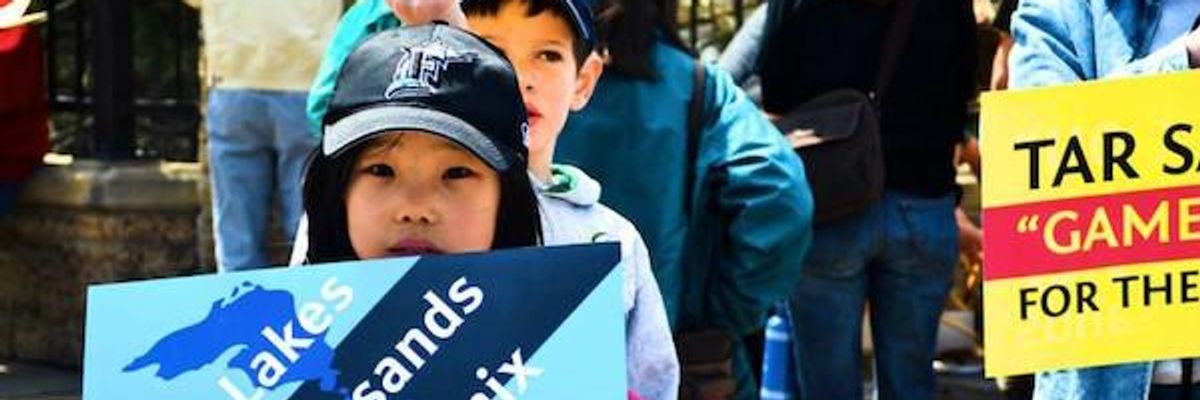A large protest in Minnesota this weekend is designed to show that the resistance to tar sands goes well beyond Keystone XL, as numerous environmental and social justice groups come together with Indigenous communities across the region to make their unified demands clear to all: "keep toxic tar sands out of America's Heartland, fight for clean water, clean energy, and a safe climate."
On Saturday, the Tar Sands Resistance March in downtown St. Paul will cap a week of convergences and local actions calling attention to and speaking out against various pipeline and infrastructure projects across the Midwest.
"This whole region should be concerned with the number of pipelines that are coming from the tar sands that seem to be where the action is right now and it's just a wrong headed approach," said Wade Schafer of the North Dakota Sierra Club.
We Interrupt This Article with an Urgent Message! Common Dreams is a not-for-profit organization. We fund our news team by pooling together many small contributions from our readers. No advertising. No selling our readers' information. No reliance on big donations from the 1%. This allows us to maintain the editorial independence that our readers rely on. But this media model only works if enough readers pitch in.
We urgently need your help today.
If you support Common Dreams and you want us to survive, your gift today is critical.
Please give now to our Mid-Year Fundraiser!
|
Thousands of people are expected to come out for the day of action, which organizers say might be the biggest anti-tar sands event in the Midwest, with activists joining from as far away as Nebraska and Ohio. In St. Paul, representatives for participating groups said they were particularly concerned with plans by Enbridge Energy to double the size of Line 67, which currently transports 450,000 barrels of tar sands per day through the state. Enbridge plans to expand that to 800,000 barrels, which will require constructing pump stations and other equipment in cities throughout Minnesota.
"This event is just one moment in a growing movement to stop tar sands and it is powerful."
--Catherine Collentine, Sierra Club
Andrew Slade from the Minnesota Environmental Partnership told the Northlands News Company this week that companies should pursue renewable energy and leave fossil fuels in the ground. "All these pipelines really do is kind of accelerate an environmental disaster," said Slade. "So let's keep that oil in the ground and find cleaner ways to run our economy."
And representatives from the Indigenous Environmental Network told the NNC that the pipeline expansion is more than just an environmental problem--it also threatens human rights, as it could affect the health of northern watersheds near tribal land.
The protest comes ahead of a possible milestone on another Enbridge project, the Sandpiper, as the state's Public Utilities Commission debates granting the energy giant a certificate to go ahead with the pipeline which would carry crude oil from the Bakken oilfields in North Dakota across northern Minnesota to Midwest refineries.
For other activists, the choice to take part in Saturday's protests was much simpler. Carol Jean Larsen, Sierra Club member, told KFYR-TV, "It was important for me to be part of public witness that developing the tar sands is just a dumb idea."
Speakers at the protest will include Reverend Lennox Yearwood of Hip Hop Caucus, Winona LaDuke of Honor the Earth, Rep. Keith Ellison (D-Minn.), and Bill McKibben of 350, among others.
"We know what we want and we will let our leaders know too," Catherine Collentine, Sierra Club tar sands campaign representative, wrote in a blog post. "This event is just one moment in a growing movement to stop tar sands and it is powerful."
One of the organizers, Indigenous Environmental Network executive director Tom Goldtooth, explained to the Grand Rapids Herald Review that this weekend's action shows how "The frontline communities are strengthening the resistance. They're concerned, and we are linking up the pipeline resisters in Canada, northern Minnesota, out east and more."

